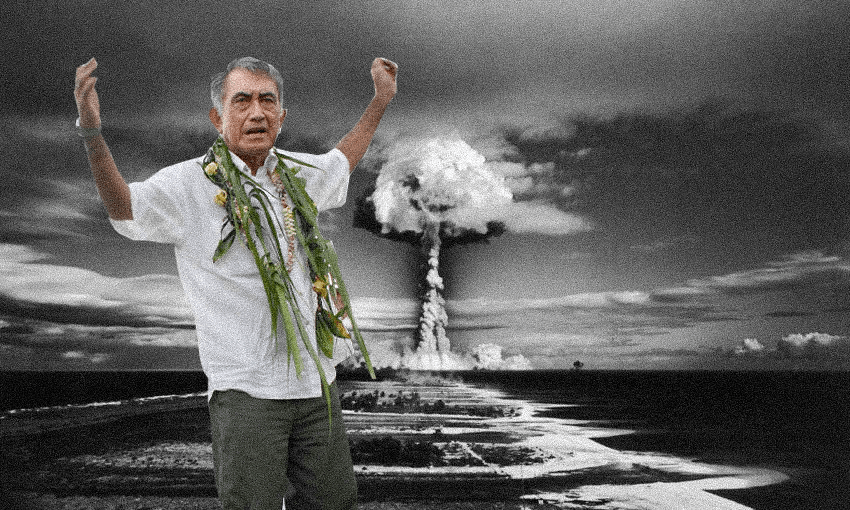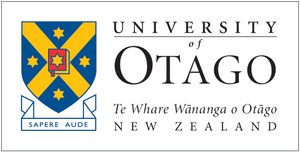The Tahitian leader has refused to stop fighting against nuclear testing and its effects on his people. New Zealanders must do the same, writes Jenny Te Paa-Daniels.
For those with memories of Mururoa, the name Oscar Temaru ought to be synonymous with the atoll and the protest against French nuclear testing in the Pacific. For more than 40 years, the Tahitian leader has rallied the indigenous Maohi peoples of Tahiti and stood against the arrogance of France as it tested its nuclear weapons, not in its own country, but in the middle of Temaru’s backyard in the beautiful South Pacific islands. While the nuclear tests may have stopped, he and his people continue to suffer under French oppression.
Between 1966 and 1996, the period of testing in and around Mururoa and Fangataufa Islands, many New Zealanders joined in solidarity with the anti-nuclear struggle. Some even sailed to Mururoa to protest the French actions.
So too did our navy, which sent two frigates in 1973 to observe the tests. The heartbreaking results of that action were reported on this year under the headline, “Mururoa veterans found to have higher cancer rates“.
An Otago University study published in the New Zealand Medical Journal in May provides conclusive evidence that a greater proportion of the navy veterans who sailed to monitor the Pacific testing are affected by a range of cancers than the general New Zealand population. In addition, the study found that the fertility of the children and mokopuna of nearly 40% of these servicemen and women is seriously compromised.
The indifferent response to this study thus far from New Zealanders and the anti-nuclear movement is deeply concerning.
While these recent revelations demand this government’s urgent attention, let us not forget the people in whose home these tests occurred. People who were exposed not just once from a supposedly safe distance but people whose only living environment, and their primary food source, was assaulted nearly 200 times over the 30-year period of French nuclear testing. These enduring and devastating health outcomes for the people of the Tahitian islands, and the destructive effects on their pristine ocean environment, are the inspiration for the actions of Temaru.
For the past 40 years, as a political leader revered by Tahitians and reviled by the French, Temaru has been relentless in his pursuit of justice for his people. Justice that he always believed could be fulfilled only once his people achieved independence from their French colonial overlord.
Looking across the ocean at the experiences of his closest relatives in the Cook Islands and Aotearoa, Temaru has encouraged Tahitians to pursue indigenous sovereignty. He championed the pursuit of self-determination, of self-governing control of the islands and the Polynesian culture. It has been a lonely and often internationally unknown struggle, particularly given the strength of French dominance of Tahiti’s public media.
Seven years ago, Temaru’s political movement succeeded in having the UN General Assembly re-inscribe French Polynesia onto its decolonisation list, meaning it was no longer classified nor treated as a colonial possession but free to move toward becoming a self-governing country. It was a decision unequivocally shunned by France.
In 2018, the refusal by France to acknowledge this pursuit of self-determination led Temaru to initiate action at the International Criminal Court against all the living former presidents of France for alleged crimes against humanity over the nuclear tests. Tino rangatiratanga and anti-nuclear politics are thus inextricable.
Oscar Temaru has been elected as president of French Polynesia for five terms since that office was first established in 1984. He has been the elected mayor of Fa’aa since 1983. He has consistently pursued a pro-independence platform for his people. His political party – Tavini Huiraatira No Te Ao Maohi – translates as “serving the needs of the Maohi people”.
Temaru is widely regarded as one of the most politically fearless, visionary leaders within the Pacific region. He wants independence from France for his people and he wants accountability and reparation for the environmental and human damage caused by French nuclear testing.
He is seen as a threat and constant irritant to the French government, one well known throughout the Pacific for its colonial rapacity. As one Cook Island reporter recently described it, “France simply regards Tahiti, its idyllic tropical islands, as an upmarket retirement home for its citizens hoping to make ends meet on a state pension.”
Temaru’s advocacy for the peoples of Tahiti has seen him become the centre of attention of French authorities in the region. The latest is an allegation that in 2019, Temaru’s Fa’aa Municipal Council funded a community radio station, Te Fana, which in turn broadcast material politically favourable to Temaru. The French case succeeded even though no evidence of partisanship was ever produced to back the accusation. The case is still under appeal.
Earlier this year the public prosecutor launched a new probe asserting the same Fa’aa Municipal Council had misused public funds to pay for Temaru’s defence. Citing a flagrant breach of his right to the presumption of innocence given the appeal of the earlier case was still pending, Temaru took a case against the general attorney. Citing the context of Covid-19 and the difficulty of securing impartiality within Tahiti’s French judiciary, the court ruled that it be shifted to New Caledonia. Given there are as yet no flights enabling necessary travel by all parties, the case is unlikely to be resolved for many months.
In the meantime, and without obtaining a judge’s authorisation, the French prosecutor ordered the seizure of US$100,000 from Temaru’s personal bank accounts. This led Temaru to launch a two-week hunger strike outside the office of the prosecutor. His lawyers have taken this case against the prosecutor’s actions to the French Court of Cassation – the highest court in the French judiciary.
These accusations come as all Temaru wants to do is hold those responsible for the consequences of testing their nuclear bombs in his backyard. His mission is to uphold the sacred sovereign rights of his people to self-determination and cultural survival; to remind us all in the Pacific region that the beautiful islands of Tahiti are never again to be seen or used as the entitled playground of those devoid of respect for the dignity, the legal and human rights of its people.
Now, is time for New Zealanders to read and consider afresh the University of Otago report on the Mururoa veterans and while doing so, to consider afresh our solidarity with the people of Tahiti. New Zealand was renowned throughout the world for our anti-nuclear stance. We need now to reiterate that stance by making it clear that our solidarity is indeed for the common cause of justice for all in the Pacific region, and that in this we recognise and support the indigenous leadership of Oscar Temaru.
This content was created in paid partnership with the University of Otago. Learn more about our partnerships here.

